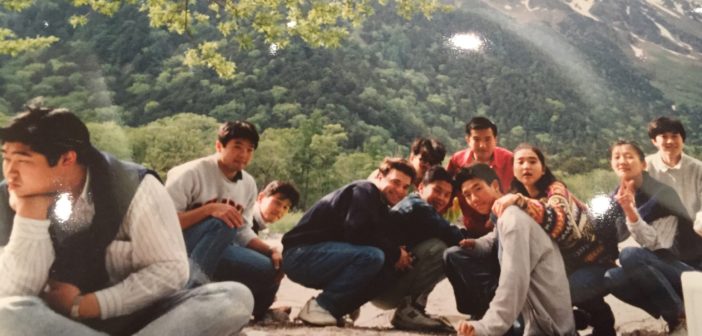Many thanks re: Japanese hospitality
A huge “thank you” to my Japanese contacts for their hospitality last week. The trip was the culmination of three case studies we’ve been working on for the past 4 months. They involved 1) brand management for one of Japan’s oldest and most famous hotels, 2) strategic planning for a Hawaiian born entrepreneur who is now a permanent Japanese resident and is successfully importing Western restaurant concepts and 3) product planning for a UK – US – Japanese joint venture. Beyond business, one of the highlights was celebrating our 25th training anniversary with my 同期, or colleagues, all part of the 1992 Imperial Hotel incoming management training program class. Check out the picture and note the guy in the middle, wearing dark blue, and who had much more hair back then! Also had breakfast with a dear Japanese friend of over 20 years, currently a successful economist, who’s going to hopefully help me locate companies for a BU trip to Japan next March.
I’m hoping to integrate the cases into my classes during the upcoming academic year. A huge “thank you,” as well, to the BU BUzz Lab’s Ian Mashiter for his support of this case study initiative and to Simona Lazea and Helen Shteynberg for their attention to detail and hard work.
Most of my contacts are long standing but even so, the welcoming speaks to general Japanese hospitality, or お持て成し. Here’s a definition from Kanebo.
Of all the memories they take home with them, visitors to Japan cherish and appreciate the ‘Japanese way of hospitality and customer service’ — Omotenashi in Japanese.
Translated simply, Omotenashi means the Japanese way of treating a guest. It blends a welcoming spirit with warmth, understanding, and above all respect. The concept is all encompassing.Etymologically, Omotenashi is a hybrid of “omote” (surface) and “nashi” (less), concepts that translate together into “single-hearted.” From the perspective of a host, this is the rendering of service without expectation of favor or reward.
Interestingly, the Japanese language makes no distinction between ‘guest’ and ‘customer.’ In English, the concept of ‘service’ suggests a hierarchy between the ‘server’ and the ‘customer.’ The Japanese Omotenashi, however, is based on a non-dominant relationship between equals – between the person offering the service (the host) and the person receiving it (the guest or customer).
To practice Omotenashi, the host pays close attention to detail and is committed to anticipating the needs of the guest, smiling sincerely and setting a happy, relaxed mood. When authentic, Japanese hospitality and service exceed the expectations of the guests. At its most exquisite, Omotenashi offers a guest a once-in-a-life-time experience. The idea resonates with Ichigo-ichie, the tea master’s belief that every encounter is single and unique.




